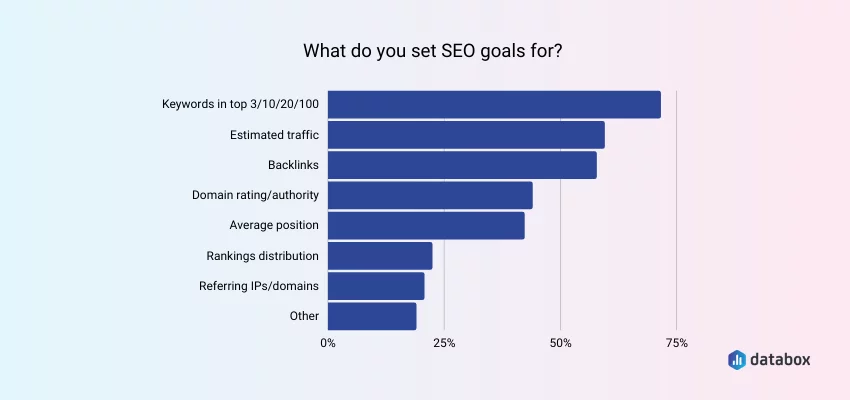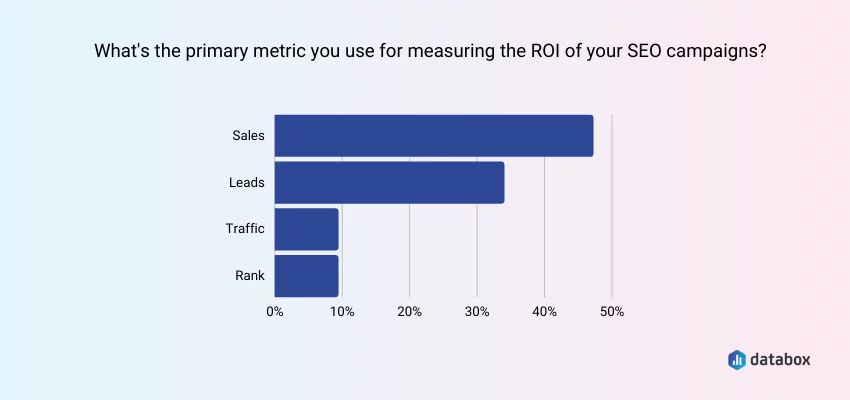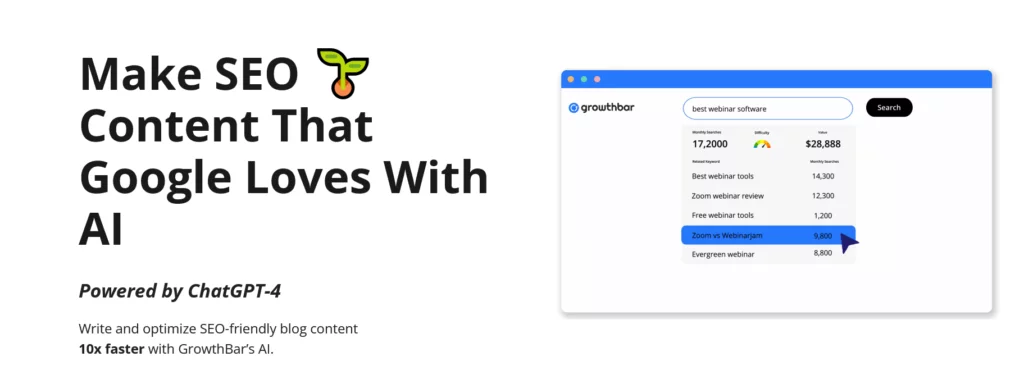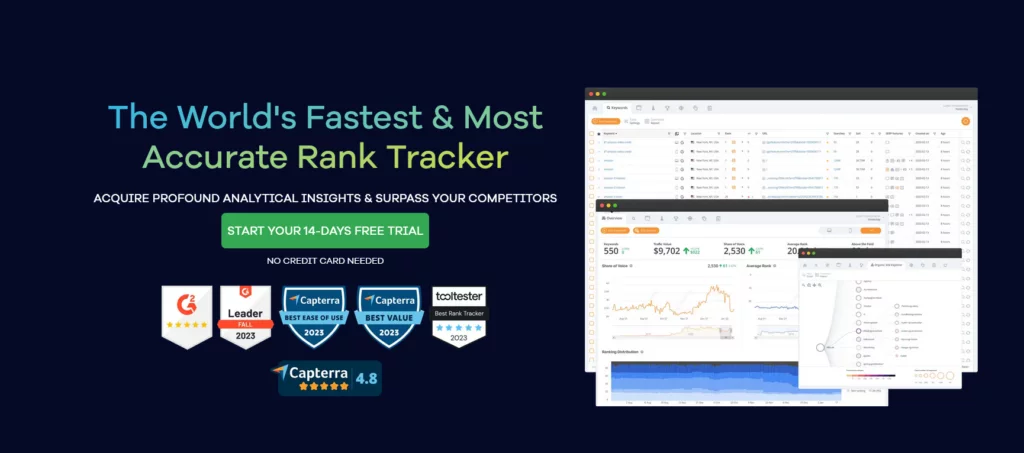In today’s digital landscape, a strong online presence isn’t just desirable—it’s essential. Search Engine Optimization (SEO) stands at the forefront of this digital evolution, determining the visibility and success of websites. Fortunately, navigating the complex realm of SEO has become more manageable, thanks to a plethora of plugins and tools designed to streamline optimization efforts.

SEO plugins and tools serve as the guiding compass for website owners, marketers, and content creators in their quest for improved search engine rankings. These resources offer a range of functionalities, from simplifying keyword research to optimizing on-page content and ensuring technical aspects align with search engine algorithms.
Benefits of SEO Plugins and Tools:

Source: Databox
- Streamlined Optimization: These tools provide a user-friendly interface that simplifies the otherwise complex process of optimizing a website for search engines. They guide users through various SEO aspects, such as meta tags, content optimization, keyword usage, and site structure, making it easier to implement best practices.
- On-Page Analysis: Plugins often offer real-time analysis and suggestions for optimizing individual pages. They highlight areas for improvement, such as readability, keyword density, meta descriptions, and internal linking, helping users fine-tune their content for better search engine rankings.
- Technical SEO Assistance: Tools assist in addressing technical SEO aspects, like XML sitemaps, canonical tags, URL structure, and site speed optimization. They ensure that the website meets technical requirements that search engines prioritize for better indexing and ranking.
- Keyword Research and Tracking: Many tools provide comprehensive keyword research features, enabling users to identify relevant keywords, assess their competitiveness, and track their rankings over time. This helps in crafting content that aligns with user search intent and optimizing for targeted keywords.
- Competitive Analysis: Advanced tools offer insights into competitors’ strategies, allowing users to analyze their keywords, backlinks, and overall SEO performance. This information helps in refining strategies and discovering opportunities for improvement.
- Link Building and Management: Some tools assist in link building efforts by identifying potential link opportunities, monitoring backlinks, and ensuring a healthy backlink profile. They also help in identifying and disavowing harmful or irrelevant links.
- Performance Metrics and Reporting: These tools provide valuable performance metrics, including website traffic, user behavior, click-through rates, and conversion data. They offer reporting features that summarize key SEO metrics, facilitating data-driven decision-making.
- Adaptation to Algorithm Changes: SEO plugins and tools often update in response to search engine algorithm changes. They adapt their functionalities to align with new ranking factors, ensuring that websites remain optimized despite evolving search engine criteria.
- Time and Resource Efficiency: By automating many SEO processes and providing actionable insights, these tools save time and resources that would otherwise be spent on manual analysis and optimization.
Top SEO Plugins of 2024:
1. Yoast SEO

Yoast SEO stands out as the reigning champion among WordPress SEO plugins. With an impressive 16,700 5-star ratings at the time of writing, Yoast continually impresses the WordPress community with its remarkable updates, an intuitive interface, and an exceptionally user-friendly approach that elevates blog posts and product pages.
The Yoast SEO WordPress plugin not only shines within WordPress but extends its prowess through its dedicated website. It offers premium support options, a thriving community forum, an educational SEO blog, and specialized courses catering to beginners, intermediates, and advanced users.
Furthermore, the Yoast SEO website provides access to its premium version, unlocking advanced features such as optimizing for five keywords per page, previewing page appearance on Twitter and Facebook, and suggesting internal links, among other premium perks. And that’s just the tip of the iceberg when it comes to the premium features it offers.
Priced at $89 per site, the premium plugin is an attractive option. However, for those on a budget, the free plugin outshines most other SEO WordPress plugins by a considerable margin.
Why Choose Yoast SEO:
- Analyze keyword optimization for pages and posts effortlessly.
- Preview and fine-tune Google search results by adjusting meta descriptions and titles.
- Conduct a readability check to improve content structure.
- Detect duplicate content within pages or posts.
- Benefit from exceptional support and resources regularly updated every two weeks.
2. The SEO Framework

The SEO Framework plugin offers a swift, streamlined solution for WordPress users seeking a lightweight SEO plugin free from ads or upsells. It prunes away unnecessary features, aiming to assist those focused on optimizing site speed and spending less time deciphering complex SEO guidelines. Often hailed as the prime alternative to Yoast, it earns this reputation thanks to its visual SEO ratings and greater flexibility in keyword targeting, including synonyms and slightly varied words.
Control over post SEO settings is consolidated into a few tabs, one of which employs a color-coded scale indicating how close your post is to being search engine-ready. This intuitive scale swiftly highlights areas needing SEO improvements, presenting a clutter-free alternative to more complex options like Yoast.
Ideal for beginners and open to advanced users through its API, the SEO Framework initially emerged as a project within the WPMUDEV community before being released to the wider audience for free. The plugin is comprehensive, offering advanced functionalities via extensions, such as Local SEO, AMP integration, article enhancement, SEO and uptime monitoring, incognito mode, redirects, and comment spam caching.
Notable Features of The SEO Framework:
- Provides essential features akin to Yoast without requiring payment for extensions or premium features.
- Visual, color-coded meter offers an easily comprehensible check for post performance on Google.
- Offers a local SEO extension catering to businesses requiring local business information display.
- Includes a comment spam extension, reducing the necessity for an additional plugin.
- Preconfigures most SEO settings, minimizing setup requirements post-installation.
- Focuses on the subject matter rather than a focus keyword, encouraging natural writing and aligning with Google’s view of synonyms in SERPs.
3. SEOPress

SEOPress emerges as a freemium SEO plugin for WordPress devoid of any advertisements. Even in its free version, it remains completely white-labeled, leaving no trace. It prides itself on simplicity, speed, and robustness, offering comprehensive management of titles and meta descriptions for posts, pages, post types, and terms.
The SEOPress plugin empowers users to generate XML and HTML sitemaps, monitor visitor traffic using Google Analytics (GDPR compliant), and optimize tags such as Open Graph and Twitter Cards for seamless content sharing across social networks. Additionally, the free version includes content analysis tools to aid web administrators in crafting improved posts. For developers, the plugin provides over 75 hooks, enabling personalized configurations.
With its premium version, SEOPress expands its functionality and incorporates advanced features such as:
- Local business SEO enhancements.
- SEO and accessibility-optimized breadcrumbs.
- Tailored optimizations for WooCommerce and Easy Digital Downloads.
- Video and Google News XML sitemaps.
- Integration with Google Structured Data Types (schemas.org) for diverse content types like product, article, event, local business, recipe, review, FAQ, course, and video.
- Backlink integration through Majestic’s third-party API.
- Integration with Google Page Speed v5 for rapid page quality assessments.
- Redirection management and 404 error monitoring.
- Google Analytics statistics directly accessible from the WordPress dashboard.
4. Rank Math

Rank Math offers comprehensive on-page SEO management for your posts, pages, products, and various taxonomies. It grants control over noindex/nofollow/noarchive meta tags for all taxonomies as well as individual posts or pages.
The plugin seamlessly integrates with Google Search Console, delivering vital information directly to your WordPress admin dashboard. Accessible at a glance, this includes details about your ranking keywords, search impressions, identified site errors by Google, and more.
Beyond this, Rank Math encompasses a suite of features such as an inbuilt 404 Monitor, Redirections, Rich Snippets, Local SEO tools, XML Sitemaps, Automated Image SEO, and recommendations for Internal Link Building.
Key Features Making Rank Math Stand Out:
- Serves as a comprehensive solution catering to diverse SEO requirements.
- Conducts an SEO Analysis based on 40 factors for every post, page, or product.
- Features an intuitive and user-friendly interface with easily understandable options.
- Automatically addresses missing alt or title tags for images.
- Includes a 404 monitor to track user-facing errors.
- Incorporates a Redirection module to redirect 404 errors to more relevant content on your site.
- Bundles an XML Sitemap module and automatically pings search engines upon post updates.
- Supports Rich Snippets with options for six different snippets like Article, Product, Recipes, Events, Video, Local Business, etc.
- Offers built-in Breadcrumbs functionality, eliminating the need for additional plugins.
- Bundles support for Open Graph and Twitter Cards.
5. SEO Squirrly

SEO Squirrly targets users who aren’t SEO experts, offering a complete SEO suite without intricate elements. Setting itself apart from other plugins, SEO Squirrly generates SEO recommendations differently. Users input their article topic and desired keyword. As they write, real-time green lights activate, providing guidance akin to having an expert whisper advice while writing.
SEO Squirrly for WordPress: SEO Squirrly stands out due to:
- Keyword optimization integrated seamlessly into the article writing process, a more streamlined approach compared to Yoast’s need to save an article to view suggestions.
- Seamless migration from an old SEO plugin to Squirrly, retaining all previous settings.
- Competitive analysis tools aiding in outranking competitors.
- Content reports for sharing SEO insights within your organization, ideal for educating writers on SEO principles.
- Weekly progress monitoring and a tool displaying recent tweets related to your topics, offering both inspiration and content improvement strategies.
6. Broken Link Checker

SEO encompasses more than just stuffing content with keywords or ensuring readability. It also involves tidying up your site by eliminating broken links, an effective way to outshine the competition. When Google encounters a broken link (leading to a 404 page), it deems it a poor user experience. Visitors don’t appreciate landing on dead-end pages.
The challenge lies in the time-consuming task of scouring through all content to locate these broken links. Enter the Broken Link Checker plugin.
Broken Link Checker for WordPress: This tool does the heavy lifting, swiftly scanning through blog posts and pages to identify broken links within minutes. It generates a list highlighting problematic links, allowing you to promptly remove or update them for better references. If the plugin remains active, it continues monitoring your site, promptly notifying you of any newly broken links.
Once corrected, the list becomes empty, signaling to Google that you maintain your site well.
Important note: Due to its continuous scanning feature, it’s recommended to activate the plugin, fix links in stages, and then deactivate it to prevent performance issues on your site.
Features Highlighting Broken Link Checker’s Value:
- Modifying broken links is conveniently performed directly from the plugin’s primary page without having to access individual posts or pages.
- The plugin offers search and filter options for links, ensuring efficient link management.
- It doesn’t limit itself to posts and pages; it also monitors comments, custom fields, and other elements, including missing images and redirects.
- An optional feature prevents search engines from following broken links on your site.
7. Rel NoFollow Checkbox

When integrating links to external pages or websites, consider their significance to Google. The search engine assesses link quality both outbound and inbound to your site. If numerous links lead to spammy websites, Google views it as manipulative and unhelpful for users. Particularly useful for affiliate links, this plugin addresses such concerns.
To safeguard your site’s rankings from potentially detrimental links, employing “rel nofollow” attributes on external links is a prudent approach. This prevents these links from influencing the ranking of the external site. Essentially, it deters advertisers who seek these links solely for enhancing rankings.
However, manually adding “rel nofollow” tags to each link within your content can be cumbersome. Enter the Rel NoFollow Checkbox plugin, offering an additional checkbox for link creation in WordPress.
Rel Nofollow Checkbox for WordPress: Next to the “Open a link in a new window/tab” checkbox, you’ll find a “rel nofollow” option, significantly reducing the time typically spent working through HTML.
Notable Features of Rel Nofollow Checkbox:
- Lightweight in design, ensuring site speed remains unaffected.
- Facilitates SEO enhancement without requiring extensive HTML editing. Simplifies the process for non-coders. Ideal for affiliate marketers.
- Quick installation within a minute or two, requiring no configuration.
- Effortlessly review guest posts or articles from writers to ensure compliance with your marketing guidelines.
8. All in One Schema Rich Snippets

Rich snippets are specialized search elements that stand out from standard results by presenting visual components like star ratings, images, and essential details. Often employed for eCommerce product pages and blog post reviews, these snippets attract user attention without being overly intrusive, providing valuable information directly in search results.
WordPress doesn’t inherently offer rich snippets functionality, but the All in One Schema Rich Snippets plugin steps in to handle this task effortlessly.
All In One Schema Rich Snippets for WordPress: This plugin streamlines your search engine results, offering users an array of elements from images to star ratings and author avatars.
Key Features of All in One Schema Rich Snippets:
- Enhanced visual structure in Google searches, appealing to both users and search engines.
- Support for various content types such as events, reviews, people, products, recipes, and videos. For instance, a recipe might display a star rating, review count, and an image of the dish.
- Simplified sharing of search results on Facebook, as the plugin ensures accurate information compilation for sharing purposes.
9. WordLift

WordLift, a WordPress plugin, leverages AI to empower content editors and marketers with advanced SEO capabilities. It streamlines content organization, automates structured data markup, and grants access to Google SERP features. Additionally, WordLift enhances content discoverability through internal links, recommendation widgets, and semantic-rich metadata. Pricing starts at €59 per month ($65/month).
WordLift for WordPress: By utilizing this plugin, you can transform your articles and pages into machine-friendly content, enhancing accessibility for search crawlers, chatbots, and personal digital assistants like Google Assistant, Siri, and Alexa, thereby optimizing your organic traffic.
Key Features of WordLift:
- Utilizes natural language processing and knowledge graphs to automate structured linked data markup.
- Incorporates WooRank’s technology to monitor content performance and deliver actionable optimization advice. Seamlessly integrates with Google Analytics.
- Notable users of this plugin include Airbnb, Amazon Audible, Greenpeace, Merck Group, and TheNextWeb.
10. Redirection

Redirections play a vital role in modern SEO strategies. When you need to redirect users from a defunct page to a new URL, employing a 301 redirect is essential. This informs search engines to prioritize the new URL and discard the previous one.
Redirection Plugin Redirection Plugin. This plugin simplifies the implementation of 301 redirects through a user-friendly URL manager. Without this tool, setting up redirects involves complex modifications in the .htaccess file and manual entries for each redirection.
Moreover, the plugin offers a system to establish “conditional” redirects. This allows redirection based on user login status, browser type, IP address, and more. The conditional system is especially useful for automatically redirecting 404 error pages.
Key Features of Redirection:
- Effortlessly sets up 301 redirects without the need for manual intervention.
- Supports conditional redirection based on parameters like login status, page type, and IP address.
- Maintains a comprehensive log of all website redirects.
- Facilitates tracking of 404 errors directly within WordPress. Enables alteration of your website’s permalink structure.
11. Slim SEO

Slim SEO distinguishes itself by automating meta tag generation, sitemap creation, schema markup addition, and redirect setup. Additionally, it facilitates the setup of Open Graph meta tags, allowing control over your content’s appearance on social media platforms.
Furthermore, Slim SEO allows users to integrate custom code into their website’s header and footer. This feature is especially useful for incorporating tools like Google Analytics or other tracking codes.
Unlike plugins such as Yoast SEO or Rankmath, Slim SEO lacks on-page analysis functionality. However, it remains a valuable choice for those comfortable with optimizing their site without relying on detailed guidance.
Key Features of Slim SEO:
- Automates meta tag generation, sitemap creation, and schema markup addition for posts and pages.
- Facilitates redirects for author pages through the plugin.
- Allows modification of content appearance when shared on social media.
- Easy to configure, with default settings suitable for most users.
12. Internal Link Juicer

Internal Link Juicer simplifies the process of creating effective internal links, a crucial aspect of solid SEO practices. With a growing content library, determining the right posts to link to becomes challenging, and this is where the Internal Link Juicer plugin proves invaluable.
This tool allows users to designate anchor keywords for each post, automatically incorporating links to relevant internal content. Users can adjust the number of links the plugin adds to individual posts, block specific content from being linked, and access statistics regarding these internal hyperlinks.
While the plugin does a commendable job, it’s still advisable to review the posts manually to identify additional linking opportunities. Leveraging both the plugin’s automation and personal expertise optimizes the process, effectively saving time.
Key Features of Internal Link Juicer:
- Assign anchor text keywords to posts within your content library.
- Automate internal link inclusion based on designated keywords.
- Configure the number of links per post and content that should or shouldn’t be linked.
- Access comprehensive reports tracking your internal link strategy.
13. XML Sitemaps

Many comprehensive WordPress SEO plugins offer automatic XML sitemap creation for websites. However, if you prefer managing your content optimizations manually or don’t use such plugins, a dedicated tool for generating a sitemap can still be beneficial.
The XML Sitemaps plugin is a hassle-free solution. Upon activation, users can easily configure settings, such as notifying search engines about site updates and creating an HTML-format sitemap.
Beyond these foundational settings, the plugin takes care of the entire sitemap generation process for your website. While submitting this sitemap to search engine webmaster tools like Google Webmaster Tools remains your responsibility, the plugin handles the creation seamlessly.
Key Features of XML Sitemaps:
- Automated generation of XML sitemaps for your website.
- Option to notify search engines about website updates.
- Automatic addition of your sitemap URL to the robots.txt file.
14. Schema & Structured Data for WP & AMP

Schema markup significantly enhances how your content appears on Search Engine Results Pages (SERPs), often displaying images, ratings, and product details alongside regular meta descriptions – known as rich snippets.
To seamlessly incorporate rich snippets into your content, Schema & Structured Data for WP & AMP is a powerful tool. This plugin simplifies the process of selecting and implementing appropriate schema types for various content:
Schema & Structured Data for WP & AMP plugin streamlines schema integration. By automatically detecting content types, the plugin assigns suitable schema markup. Additionally, it offers manual schema selection from over 35 schema types, encompassing blog posts, news articles, recipes, product pages, and more.
Customization options enable exclusion of specific content types from schema assignments, tailoring the markup to your needs. Moreover, the plugin facilitates smooth data importing from other schema markup tools, eliminating the need for complete schema rework when transitioning.
Notable Features of Schema & Structured Data for WP & AMP:
- Automatic assignment of schema to 35+ content types.
- Manual selection of schema markup for each post and page.
- Configuration settings to exclude specific content from schema assignments.
- Facilitates data import from various popular WordPress schema markup plugins.
Top 6 SEO Tools of 2024:
1. Ahrefs

Ahrefs stands as a monumental force in the realm of SEO, serving as a comprehensive solution catering to diverse SEO requirements. Its primary objective is to furnish valuable insights into competitors, identifying backlinks and keywords that can elevate one’s own business.
This SEO tool boasts a dashboard that showcases a myriad of tickers, charts, and graphs, offering insights into critical metrics such as referring domains, organic keywords, and paid keywords. While it may seem a tad pricey (starting at $99 per month for a single user), the return on investment for an eCommerce store or blog is significant, given its status as one of the premier SEO tools available. Ahrefs even proved invaluable in helping us mitigate a negative SEO attack on our site.
One noteworthy aspect is its versatility beyond WordPress; it provides an expansive site explorer and dashboard, catering to websites irrespective of their platform.
What Sets Ahrefs Apart:
- Ahrefs ranks as the ultimate keyword explorer in the market.
- It houses one of the largest databases, making it indispensable for various data-driven tasks.
- Empowers you to gauge your online presence against comparable competitors.
- Effortlessly discover content topics aligned with your site’s focus or offerings.
- Identify websites linking to your competition and leverage these insights.
- Gain visibility into your brand’s social media interactions.
- Configure alerts for new backlinks, lost links, emerging keywords, and web mentions, providing timely and actionable insights.
2. GrowthBar

GrowthBar serves as a comprehensive SEO solution, offering a suite of features that include keyword results, competitor backlink analysis, Google Ads data, and one-click blog content generation. Particularly beneficial for bloggers and content creators, this tool stands out by streamlining content creation processes. Its unique content generation feature assists in crafting content outlines with targeted keywords, introductory paragraphs, and more—all available with just a click.
This tool’s drag-and-drop content editor is tailored for WordPress users, providing a user-friendly experience. Driven by an OpenAI-powered tool, it leverages one of the most sophisticated language models, continuously enhancing its recommendations with increased usage.
The simplicity of its user interface coupled with robust data sets makes it accessible to users across skill levels. Entrepreneurs, small businesses, and freelancers can harness the power of this versatile SEO tool to amplify their online presence.
What Sets GrowthBar Apart:
- Effortlessly create content outlines aligned with targeted keywords, enabling faster content creation.
- Facilitates easy content creation by exporting content outlines directly to Google Docs.
- Access a vast index of keywords and valuable backlink suggestions.
- Boasts a sleek and user-friendly interface, ensuring ease of use for all users.
3. Accuranker:

While Ahrefs excels in keyword and backlink research, Accuranker takes the lead in keyword tracking, focusing on monitoring SEO rankings and the keywords that drive your SEO performance. Distinct from Ahrefs in its tool offerings, Accuranker serves as a pivotal tool for monitoring content marketing within Search Engine Result Pages (SERPs).
Starting at $44.95 per month, Accuranker’s base package allows tracking for up to 600 keywords across unlimited domains and monitoring a single competitor. The tool offers scalability through agency and enterprise packages, accommodating higher keyword and domain limits.
Accuranker meticulously tracks both Bing and Google, providing accurate daily updates based on specified keywords or other relevant metrics.
Key Features of Accuranker:
- Daily Keyword Tracking: Provides daily updates on keyword rankings, with the added flexibility to manually refresh rankings at any time—a standout feature compared to most tracking tools.
- Local SEO Tracking: Enables tracking by city, state, and zip code, catering to the needs of local businesses.
- Historical Data Insights: Allows retrospective analysis, enabling users to track progress, review keyword performance over time, and assess goal achievement.
- Enhanced Analytics: Provides comprehensive analytics data for each keyword, including traffic potential, traffic per keyword, and search volume.
- Automated Reporting: Offers an automated reporting feature, allowing users to customize and save report templates for easy future access and download.
- Versatile Ranking Metrics: Offers insights into mobile, desktop, and local keyword rankings and searches.
4. KWFinder

Catering to budget-conscious users, KWFinder offers accessible pricing starting at $29.08 per month, encompassing comprehensive support for keyword research, SERP analysis, rank tracking, and backlink analysis. At its highest tier of $79.08 per month, it expands the capacity for lookups and keyword tracking. While a free account option is available, it’s restricted to five lookups within a 24-hour period, making it more suitable for smaller blogs rather than larger-scale operations.
Why We Recommend KWFinder
- Stands out for its visually appealing and user-friendly interface.
- Provides more accurate search volumes compared to other tools in the market.
- Presents a competitive pricing structure, with the option to explore functionalities via a free plan.
- Offers a logical and user-friendly keyword difficulty score, suitable for those managing smaller keyword volumes without sacrificing comprehension.
5. Google Keyword Planner:

For those seeking potent SEO assistance without investing in a keyword research tool, Google Keyword Planner is a go-to resource. Widely utilized by online marketers exploring optimal keywords for paid advertising, it offers hyper-local search volume metrics, particularly beneficial for small-scale, localized businesses. Moreover, its capacity to target audiences based on demographics proves invaluable for eCommerce ventures.
Despite relying on averages rather than definitive trends, this tool’s synergy with Google Trends enables users to discover appropriate keywords and assess their performance. However, for more precise data, opting for a premium tool might be preferable.
Why We Value This SEO Tool
- Ideal for local businesses and product-focused companies seeking geographic targeting options.
- Stands out as one of the best SEO plugins for WordPress, requiring no integration and allowing easy data cross-referencing.
- As a product from Google, it leverages direct involvement with the dominant search engine.
- Offers extensive functionalities without requiring any monetary investment.
- Facilitates uploading keyword lists for campaign forecasting within Google Ads.
6. SEOquake:

SEOquake diverges from traditional SEO tools by predominantly functioning as a Chrome extension. This approach allows users to seamlessly perform on-page SEO audits directly on visited pages without navigating complex dashboards. Real-time assessments of external and internal links, URL and domain comparisons become instantly accessible.
Despite being a Chrome extension, SEOquake offers an impressive array of data. It delivers insights into various elements like URLs, titles, servers, meta descriptions, social activity, and Alexa Pagerank, all within the confines of a tiny plugin.
What Makes SEOquake Stand Out
- As a free Chrome extension, it offers quick SEO insights without the bulk of a dashboard, ensuring ease of use.
- Additional data from a Semrush account can enhance its capabilities, making it a great complement to Semrush.
- Available not only as a Chrome extension but also as an option for Firefox users.
- Offers the convenience of printing and exporting SEO data for external use or documentation purposes.
Factors to Consider Before Choosing SEO Plugins and Tools
1. Features and Functionality: Evaluate the tool’s offerings, focusing on essential functionalities such as keyword research, on-page optimization, backlink analysis, technical SEO audits, and competitor analysis. Ensure it aligns with your specific SEO objectives and strategies.
2. User Interface and Ease of Use: A user-friendly interface is pivotal, especially for beginners. Look for intuitive navigation, clear instructions, and easily comprehensible reports and insights to streamline your SEO efforts.
3. Compatibility with Your Platform: Check the compatibility of the plugin or tool with your website’s platform (e.g., WordPress, Shopify, or other CMS platforms). Ensure smooth integration with existing systems or plugins.
4. Performance and Speed: Opt for tools that don’t significantly slow down your website’s performance. Slow-loading plugins can impact user experience and search engine rankings adversely.
5. Support and Documentation: Consider the availability of customer support, comprehensive documentation, tutorials, and active communities. Reliable support aids in issue resolution and maximizes the tool’s capabilities.
6. Data Accuracy and Reliability: Verify the tool’s track record for providing accurate analytics, precise keyword search volumes, reliable backlink data, and other essential SEO metrics.
7. Scalability and Pricing: Assess the tool’s scalability as your website grows. Evaluate pricing plans that align with your budget and offer scalability or additional features at higher tiers.
8. Reviews and Reputation: Research and read reviews from credible sources within the SEO community. Consider the tool’s reputation and history of delivering effective results.
9. Trial Period or Demo: Prefer tools that offer free trials or demos. Utilize these opportunities to test functionality, assess the user interface, and ensure compatibility with your website before committing.
Conclusion:
In the vast landscape of SEO plugins and tools, finding the right fit can significantly impact your website’s visibility and success. Consider the unique needs of your website, your level of expertise, and the specific SEO aspects you aim to improve.
From comprehensive solutions like Yoast SEO and SEMrush to specialized tools such as Ahrefs and Moz, each offers distinct advantages. User-friendly interfaces, robust keyword research, backlink analysis, on-page optimizations, and insightful analytics are some common features across these tools.
Remember, the best SEO tool ultimately aligns with your goals and workflow, providing actionable insights to enhance your website’s performance on search engines.
FAQs on SEO Plugins and Tools:
Are free SEO plugins effective?
Some free SEO plugins like Rank Math, SEOquake, and Google Keyword Planner offer valuable functionalities. However, premium tools often provide more advanced features, comprehensive analytics, and better customer support, making them more effective for professional SEO efforts.
Do all websites need an SEO tool?
While it’s possible to improve SEO without dedicated tools, using SEO plugins and tools streamlines the process and enhances efficiency. They offer insights, analytics, and suggestions that are crucial for optimizing content and ranking higher on search engines.
Can SEO tools guarantee top search engine rankings?
No SEO tool can guarantee a top position on search engine results. SEO tools provide insights and optimizations, but several factors, including competition, content quality, and user experience, influence search rankings.



